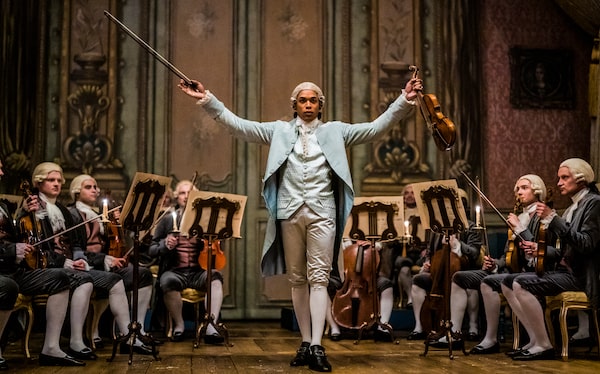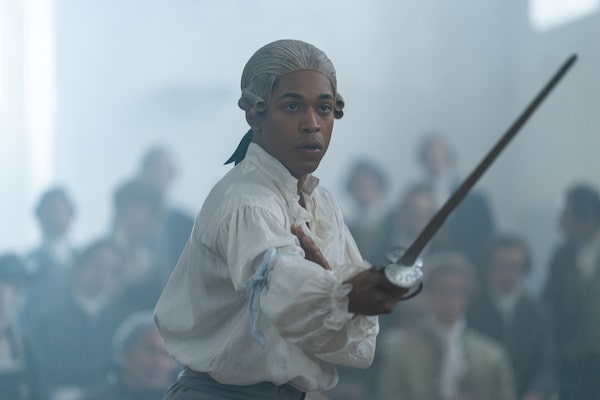
Kelvin Harrison Jr. in Chevalier.Photo Credit: Larry Horricks/Courtesy of Searchlight Pictures / 20th Century Studios
Chevalier
Directed by Stephen Williams
Written by Stefani Robinson
Starring Kelvin Harrison Jr., Samara Weaving and Lucy Boynton
Classification: PG; 107 minutes
Opens in select theatres April 21
The new biographical drama Chevalier, chronicling the life of the lost-to-history French-Caribbean musician Joseph Bologne, is bookended by two stirring moments that weave high society and higher drama into note-perfect singularity.
The first is set in late-1700s Paris, where a cocky young Wolfgang Amadeus Mozart (Joseph Prowen) is entertaining a hall of powdered-wig patrons before he is challenged to a musical duel by a young Black man stepping forth from the crowd. It turns out that Mozart is no match for this unknown prodigy. Bologne (Kelvin Harrison Jr.) goes string-to-string with the legend with a deceptively easy ferocity, captured by director Stephen Williams as if the two musicians were engaged in a guitar-shredding competition à la Clapton versus Hendrix, or bar-spewing rap battle. The moment ends with Mozart bodied, as today’s kids might say, furiously and anachronistically wondering aloud who the [redacted] this Bologne character is.
The film’s second high-pitch moment arrives at its very end, when Bologne is forced to weigh his art against his ideals, culminating in a rousing set-piece involving a full-piece orchestra and shouts of “Liberté!”, bringing the past to glorious, fiery, contemporary life.
Unfortunately, the moments between these two memorable scenes are scored with a dramatic tension resting somewhere between flat and barely audible, with a remarkable man’s story funnelled through distressingly ordinary biopic tropes.
What to watch in 2023: Our favourite new movies
The product of a married plantation owner in Guadeloupe and his Senegalese-born slave, Bologne revealed a gift for music early in life, prompting his father to ship him to France as a young boy to train. Despite enduring a separation from his mother and racial abuse from his fellow students, the virtuoso rose to become an acclaimed musician and composer, playing for Marie Antoinette (Lucy Boynton) and awarded the prestigious “Chevalier” title. But as France headed toward Revolution – and Bologne’s affair with married opera singer Marie-Joséphine de Montalembert (Samara Weaving) risked leaking to the wider world – the musician’s career, life and legacy faced a reckoning.
That sounds like enough drama to sustain a compelling film, but for myriad reasons, Chevalier’s energy and imagination never feel adequately reflected in this cinematic retelling. It is not as if the filmmakers were hemmed in by the facts of the man’s life – Bologne likely spent a few weeks sharing a guest house with Mozart, but they never duelled it out Charlie Daniels-style – or any preconceived cultural notions. Thanks to Napoleon’s purging of Bologne’s music from the history books, contemporary mainstream audiences are as likely to be as aware of his life as they are to believe that, say, Lydia Tár is a real person.
Still, screenwriter Stefani Robinson (television’s Atlanta and What We Do in the Shadows) plays it exceedingly safe throughout, refusing to take much liberty (or liberté) with Bologne’s life as might benefit a truly invigorating piece of cinematic storytelling. You know the motions even if you don’t know the man or his period trappings, with the narrative culminating in a moment of Bologne embracing his cultural roots in the streets of Paris that feels almost embarrassed of itself, as if it should (and likely does) know better.

Kelvin Harrison Jr. plays Joseph Bologne, a lost-to-history French-Caribbean musician.Photo Credit: Larry Horricks/Courtesy of Searchlight Pictures / 20th Century Studios
The film is all the more frustrating an experience given that it inches so close to greatness. Williams, a Canadian director who has been responsible for some of the most thrilling hours of American television (Lost, HBO’s Watchmen), constantly pushes the material and elements that he’s afforded to the hilt.
Sometimes, Williams notches a win, such as collaborating with Harrison Jr. to deepen Bologne into a huffing, puffing force of nature – a man who would be light years ahead of his time were it not for the crushing weight of that chip on his shoulder cementing him into place. At other points, though, Williams’ designs of visual grandeur fall victim to a deficit of production values: The costumes appear to be lavishly produced, but the sets arrive as if mistakenly shipped from a cheaper, no-frills period piece a few studio doors down.
Ultimately, Chevalier offers a lesson both historical and cautionary. To tell the story of an artist, you have to let your own artistic soul soar, free, clear and high, damn the limitations.
 Barry Hertz
Barry Hertz